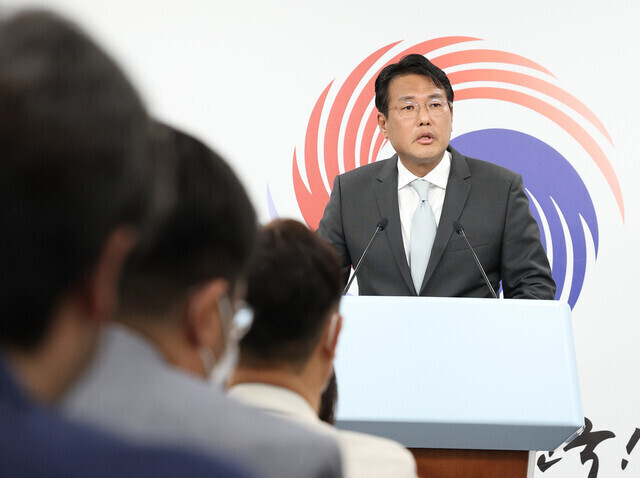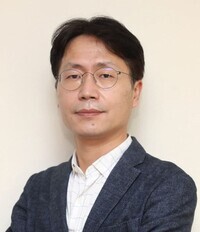hankyoreh
Links to other country sites 다른 나라 사이트 링크
[Correspondent’s column] Yoon, don’t go issuing any blank checks to the US


By Lee Bon-young, Washington correspondent
South Korea and the US will be holding a summit on Saturday. This is the fastest a summit has ever been scheduled after a Korean president took office.
This is an important summit, being held amid serious challenges at home and abroad as North Korea speeds up its development of nuclear weapons and missiles, Russia wages war in Ukraine, and the US ratchets up its containment of China.
For Korea, the summit represents an opportunity to strengthen relations with the US, but also presents drawbacks. President Yoon Suk-yeol’s behavior since taking office and the current state of his administration give reason to worry.
First, there’s the experience gap between the two leaders. Yoon, who has no diplomatic experience, will be meeting with the president of the most powerful country in the world a mere 11 days following his inauguration.
After becoming a senator at the age of 30, US President Joe Biden (who is now 79) served for a long time on the US Senate Foreign Relations Committee, which he chaired on two occasions. During his half a century in politics, Biden spent eight years as vice president and has been present at major sites of conflict and diplomacy.
Not even a reference to David and Goliath could convey the immensity of the gap in experience between Yoon and Biden.
Plus, South Korea is highly dependent on the US for its security amid troubling times, which gives the US even more leverage.
If Korea and the US were in a zero-sum relationship, with each side looking for weaknesses they could use to squash the other, Korea would be at an extreme disadvantage. Fortunately, this is a meeting between allies, and their agenda was worked out in advance.
A second issue is Yoon’s tendency to regard his predecessor’s policy toward the US as having been a major failure. Talk about “restoring” Korea’s relationship with the US implies that the relationship was wrecked by the Moon administration.
Hawks in the US may have been annoyed about Moon Jae-in’s approach toward North Korea. But there are no grounds for thinking the bilateral relationship was weakened overall.
If Yoon really thinks the bilateral relationship was wrecked, perhaps he ought to rebuke the American president for his poor foreign policy, considering that the US is the leading partner in the relationship.
One of the basic principles of politics is that tearing down the other side can be profitable, since it allows you to shore up your own. But after the dust has settled, all policy, including foreign policy, ought to circle back to the primary goal and criterion of the public good.
Yoon seems to be locked in campaign mode as he shops for shoes and buys snacks during his public appearances. No matter how hard it may be to switch gears after the election, he mustn’t let domestic politics impact his summit with Biden.
Third, Yoon seems to have a tendency to show his hand. Shortly before becoming president, Yoon said that he wanted to join the Quadrilateral Security Dialogue, commonly referred to as the Quad, but would begin by attending the working group since membership isn’t feasible yet. Japan, one of the members of the Quad, is reportedly opposed to Korea joining.
By saying all that in public, Yoon pointlessly disclosed his attitude to the US and Japan. That also had the effect of needlessly irking China, when Korea can’t even become a full member of the Quad.
Another example is Yoon’s pledge to deploy another THAAD anti-missile battery in Korea. He talked that up during his campaign but quietly shelved the idea afterward. The US didn’t support the Korean president-elect’s ideas about expanding Quad or adding a THAAD battery. All this dilly-dallying only makes Yoon lose credibility.
Finally, and most troubling of all, is the possibility that Yoon will write a “blank check” for Korea. That’s ultimately linked to the three concerns mentioned above.
In diplomatic history, the “blank check” refers to Germany’s promise of unconditional support to Austria-Hungary in 1914. Backed by that promise, Austria-Hungary initiated hostilities in World War I, and Germany had no choice but to honor the blank check it had written.
Issuing a blank check is a rash behavior that must be avoided at all costs in relations with other countries.
The Americans are no doubt licking their chops at all the enticing things that Yoon said during his campaign. If Yoon thinks the Korea-US relationship can only be “restored” if he does everything that Washington wants, he may find the consequences difficult to bear.
The same goes for after the summit. Yoon needs to avoid making comments or statements that will limit Korea’s economic options or its ability to manage relations with China and North Korea.
Please direct questions or comments to [english@hani.co.kr]

Editorial・opinion
![[Editorial] Intensifying US-China rivalry means Seoul must address uncertainty with Beijing sooner than later [Editorial] Intensifying US-China rivalry means Seoul must address uncertainty with Beijing sooner than later](https://flexible.img.hani.co.kr/flexible/normal/500/300/imgdb/original/2024/0517/8117159322045222.jpg) [Editorial] Intensifying US-China rivalry means Seoul must address uncertainty with Beijing sooner than later
[Editorial] Intensifying US-China rivalry means Seoul must address uncertainty with Beijing sooner than later![[Column] When ‘fairness’ means hate and violence [Column] When ‘fairness’ means hate and violence](https://flexible.img.hani.co.kr/flexible/normal/500/300/imgdb/original/2024/0516/7417158465908824.jpg) [Column] When ‘fairness’ means hate and violence
[Column] When ‘fairness’ means hate and violence- [Editorial] Yoon must stop abusing authority to shield himself from investigation
- [Column] US troop withdrawal from Korea could be the Acheson Line all over
- [Column] How to win back readers who’ve turned to YouTube for news
- [Column] Welcome to the president’s pity party
- [Editorial] Korea must respond firmly to Japan’s attempt to usurp Line
- [Editorial] Transfers of prosecutors investigating Korea’s first lady send chilling message
- [Column] Will Seoul’s ties with Moscow really recover on their own?
- [Column] Samsung’s ‘lost decade’ and Lee Jae-yong’s mismatched chopsticks
Most viewed articles
- 1[Editorial] Transfers of prosecutors investigating Korea’s first lady send chilling message
- 2[Column] US troop withdrawal from Korea could be the Acheson Line all over
- 3Xi, Putin ‘oppose acts of military intimidation’ against N. Korea by US in joint statement
- 4[Editorial] Intensifying US-China rivalry means Seoul must address uncertainty with Beijing sooner t
- 5[Exclusive] Unearthed memo suggests Gwangju Uprising missing may have been cremated
- 6‘Shot, stabbed, piled on a truck’: Mystery of missing dead at Gwangju Prison
- 7[Column] When ‘fairness’ means hate and violence
- 8China calls US tariffs ‘madness,’ warns of full-on trade conflict
- 9[Editorial] Yoon must stop abusing authority to shield himself from investigation
- 10China, Russia put foot down on US moves in Asia, ratchet up solidarity with N. Korea